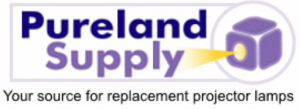How do you tell if this OEM Philips bulb is really an OEM?
There is the cost. Was the lamp 50% less than most of the other listings of the same lamp?

Let’s use a Hitachi DT01291 replacement lamp. This is used in over two dozen units across four manufactures(Hitachi, Dukane, Christie, and Infocus). The original bulb is a Philips UHP 330W. This is a higher wattage bulb and not an easy one to substitute.
I purchased one of these half priced lamps myself to see how they could sell it so cheap (well under the cost of the real bulb itself!). After having to wait 2 weeks for the 2-day air shipment I paid for, the lamp arrived. It was stuffed into a USPS box with some paper as padding. Fortunately the lamp was also inside a box with some foam or it would have been damaged.

First thing I noticed was the housing. The plastic was cheap looking. There were fingerprints on the lens (big no no) and there was a paper warranty sticker on the seam of the housing. The edges of the housing were sloppy. The mold used was obviously well worn. It was probably from an original lamp and had been discarded and then re-used by the housing company who made this particular housing. I may be wrong but in seeing where they blanked out the OEM name on the side, I suspect I am not. While not terrible or dangerous, having a substandard housing can cause cooling problems and alignment problems with the projector.
Next thing I looked at was the bulb itself. Philips has a very specific set of part numbers/codes used to track their bulbs. Each bulb can be traced back to where it was made and when and even who it was sold to.

The ceramic label on the side was the first code I look at. This particular bulb said ‘452/53 330/264W 1.0’ . Under it is the rest of the serial #, date code and manufacturer location code. That in itself looked OK. It wasnt until I turned the bulb over and noticed a piece of info that seemed to contradict the label. There is a serial number printed directly on the reflector. If it was a real Philips 452/53 bulb, the serial number on the bulb would have an aftermarket designation, “AMxxxxx”. This bulb had a new construction serial number. Meaning the bulb was made to be sold inside a new projector rather than a replacement lamp. The serial number as just the numbers without the ‘AM(aftermarket)’ in the front. This made me very suspicious…
The next and most definite place to look is at the arc tube/burner (referred to as burner from here on).
The burner is the glass tube that actually makes the light. This is the part that unscrupulous companies put into used bulbs by clearing out the old burner and cementing in a new burner. They then pass them off as new OEM bulbs.
The OEM burner should have another serial number actually molded into the end of the burner near the tip. You should be able to read it or at least see that its there. If there is no serial number and the bulb is supposed to be an OEM, you can safely believe it to be counterfeit.

All OEM Philips Bulbs have a serial number on the end.
I even went as far as to contact Philips directly and they were able to confirm my findings. The bulb here was sold originally to a real company and was then likely sent back as a recycle bulb. Normally the bulbs are crushed and used to make new glass(it’s good quality glass). In this case the bulb had the old burner removed and new, non-oem burner cemented it.
This is how the company was able to sell what they called an OEM bulb inside for more than half the cost of everyone else.
Being that I can’t confirm they are doing it on purpose, I will not be disclosing their name. It really doesn’t matter as there are many companies doing this. This company just happened to be the one I bought from.
It is up to you as a consumer to make an informed choice. The too-good-to-be-true holds fast here.
If you aren’t sure if the deal you are seeing is worth it, I would recommend calling around. Call us of course (1-800-664-6671) as we can guarantee our lamps are properly made without replaced burners or counterfeit bulbs. The pricing should be within $20-30 or so no matter who you call. If the price is $100 less with one company, you can figure they have a counterfeit lamp and play it safe buying it elsewhere.

Leave a Reply
You must be logged in to post a comment.